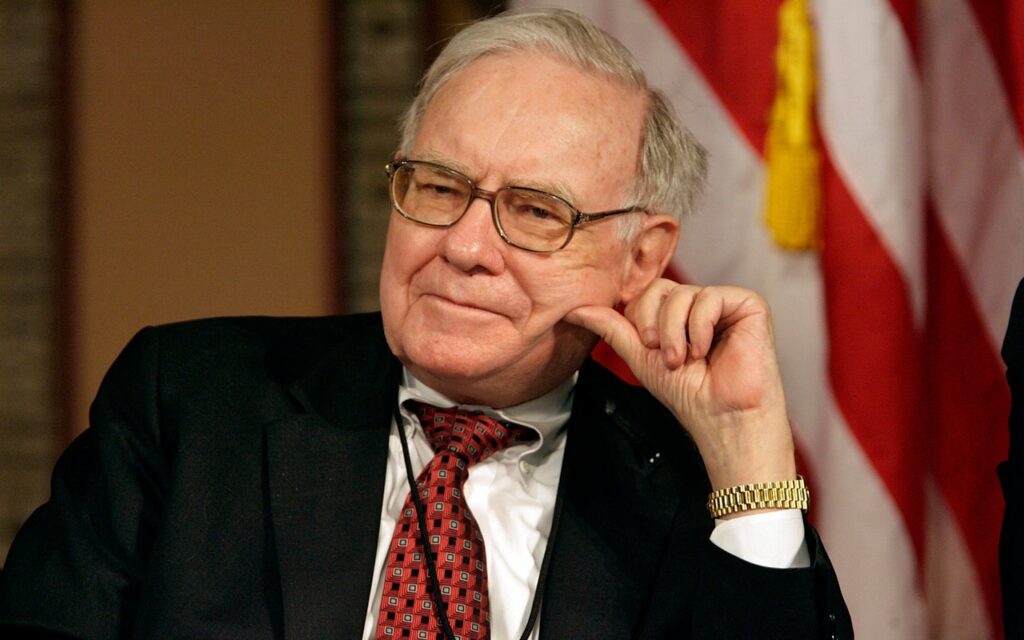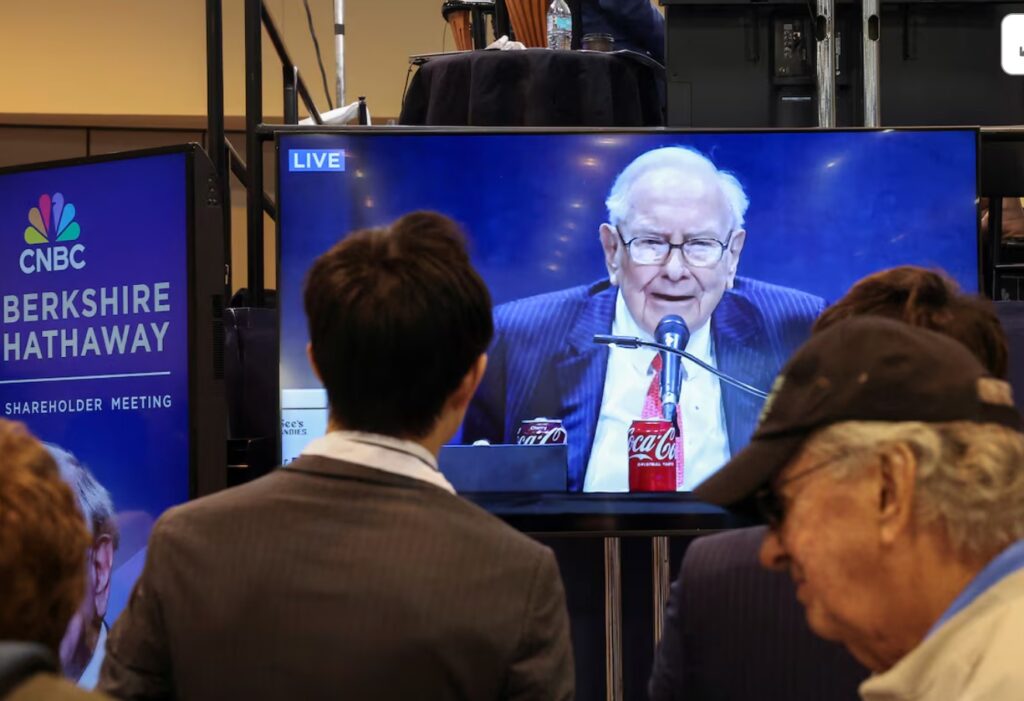world’s most famous investor Warren Buffett is preparing to step down from leading his vast conglomerate, Berkshire Hathaway. His sudden decision has created ripples in global markets.
The pressing question now is: why is Warren Buffett stepping away from the empire he built? Is it solely due to age, or is there more to the story?
This article explores that question and also highlights key aspects of Buffett’s life.
For over six decades, Warren Buffett built this financial powerhouse. At 94 years old, he is known as the “Oracle of Omaha.” He was given this moniker after he was able to bring Berkshire Hathaway to global prominence while starting from nothing.
His most recent announcement was that he intends to name Greg Abel as the new chief executive officer of Berkshire Hathaway by the end of the year.
Warren Buffett said, “It is time for Greg to become CEO by year-end. I want to present this proposal to the board of directors.”
Greg Abel, now 62, was already named by Buffett as his successor. Abel currently serves as Vice Chairman of Berkshire’s non-insurance operations. Buffett confirmed that he did not inform Abel or any other director beforehand. It was at the end of the 60th Annual Shareholders meeting of Berkshire held in Omaha, Nebraska, he mentioned this.
Around 200 companies are looked after by Berkshire Hathaway which is a multinational conglomerate. Buffett purchased hold of the company in 1965 when it was still a mid-sized textile manufacturing company.

Now, Berkshire controls over 60 firms such as GEICO it’s insurance subsidiary, Dairy Queen its fast food franchise and duracell batteries. The firm also has significant controlling stakes in Apple, Coca Cola, Bank of America and American Express.
Warren Buffett intends to speak with the directors for further deliberation concerning those queries and his decision. He said, “My two director children know what I’m going to say. For the others, it will be new.”
However, Buffett has stated he will still be nearby and able to help in some matters. Yet, full responsibility will now go to Abel. After the announcement, thousands of shareholders gathered in Omaha responded with loud applause.
Christopher Rossbach, Chief Investment Officer at J. Stern & Co. and a long-time Berkshire shareholder, said emotionally, “This is truly a historic moment. Berkshire Hathaway is an incredible business and an extraordinary achievement. It represents the very best of American capitalism and entrepreneurship.”
Warren Buffett is stepping down during a moment of great success. On Friday, Berkshire’s Class A stock—held by Buffett and early investors—closed at a record high of $809,808.50. This price reflects both long-term investment success and strong business performance.
Since the beginning of the year, the stock has risen 20%, while the S&P 500 Index has declined by 3%.
Buffett reassured shareholders that he will retain his Berkshire shares despite stepping down from formal leadership. He said, “I have no intention of selling a single share of Berkshire—none at all. I will gradually donate them.”
After the announcement, Cole Smead, CEO of Smead Capital Management, turned to his father, Bill Smead, and said, “An era has ended. It’s sad, but it’s life.”
Today, Berkshire earns revenue from a wide range of companies, including GEICO, aerospace manufacturing, railways, and chocolate shops. Its original textile business was shut down in 1985.
According to Forbes, Warren Buffett is among the richest people in America, with assets of nearly $168 billion. Despite this, he lives like an ordinary person. Every year, he invites shareholders to Omaha for a celebration. For more than 40 years, he has taken only a modest salary of $100,000 per year.
After the death of his longtime friend and business partner Charlie Munger in 2023, speculation grew about when Warren Buffett might retire. That question was finally answered on Saturday in Omaha.
Reactions to the Warren Buffett Step Down
Several business leaders, including Apple CEO Tim Cook, issued statements honoring Warren Buffett’s legacy.
Tim Cook posted on X, “There has never been anyone like Warren Buffett. His wisdom has inspired countless people, including me. Knowing him is one of the great privileges of my life. And there is no doubt he is leaving Berkshire in excellent hands with Greg.”
CFRA Research analyst Cathy Seifert said, “The key question going forward is: without Warren Buffett, will Berkshire still have the ‘Buffett premium’? When you buy this stock, you are buying the investment genius of a legend. When that legend is gone, what is the value?”
Why Now?
In 2023, Mr. Warren Buffett published a rare letter admitting that although he does not want to step down, he is “playing extra innings.” That is, he is in the extended phase of his career.
He had previously mentioned retirement a few times. But his decision to retire during this fragile moment in the American economy has raised questions.
Especially after his recent open criticism of President Donald Trump’s tariff policies. Warren Buffett has been a consistent opponent of Trump’s tariffs. He recently spoke out again.
He said, “There’s no doubt that trade can become an act of war.”
Although he did not directly name Trump, the meaning of his remarks was clear. His comments came as both U.S. and international analysts express growing concern that tariffs could seriously slow global economic growth.
Two months ago, in an interview with CBS, Buffett said tariffs are “a tax on goods”—a direct contradiction to Trump’s claim that tariffs are painless revenue generators. Buffett added that the burden of tariffs ultimately falls on consumers.
It is not known whether the Trump administration exerted any pressure on Buffett or Berkshire in response to his remarks.
Still, many analysts suspect that Buffett’s decision to step down during this economic climate may be a way to avoid unnecessary controversy or pressure.
Many investors have seen Berkshire—and Buffett’s leadership—as a safe haven amid economic uncertainty and Trump’s trade policies.

Who Is Greg Abel?
Berkshire Hathaway now has Canadian born executive, Greg Abel, set to lead the company. Currently, he oversees as Vice Chairman of Berkshire’s non-insurance operations as well as CEO of Berkshire Hathaway Energy. Abel was considered esonated As part of BOD of Berkshire San Diego in 2018. Abel is eassumed in 2018 and has been considered to be Buffets natural successor.
Analysts see this transition as largely positive. Nate Garrison, CIO of World Investment Advisors, said Buffett’s retirement “was coming,” and that Abel’s selection “had been clearly signaled.” Art Hogan of B. Riley Wealth agreed, saying Buffett is leaving behind “an extraordinary” record and that now is a “reasonable” time to step down.
However, Sierra Club staff attorney Rose Monahan has sharply criticized Abel’s leadership in the energy division. She said, “Under Greg Abel, Berkshire Hathaway Energy operated some of the nation’s most polluting coal plants. That’s a fact. There’s no sign that Berkshire wants to lead on climate issues, and Abel’s appointment is the first proof.”
Early Life
He is the second of three children of Howard and Leila Buffett. His older sister Doris was born in 1928, and his younger sister Bertie is three years younger than Warren.
Buffett’s father, Howard, was a stock market investor with a brokerage business. As a child, Warren often saw his father come home with stacks of papers. Curious, he asked his mother what his father actually did. She replied, “He’s an investor.” That moment shaped Buffett’s future. Even in grade school, he wrote “Warren Buffett: Future Investor” in his notebook.
Seeing his son’s deep interest in investing, Howard advised, “If you want to become a great investor, learn to think like a business owner and build your net worth.” Buffett never forgot this advice. His father planted the seed of investing in him.
As a child, Warren once told his friend that he would be a millionaire by the age of 35. With that goal in mind, he bought his first stock at the age of 11. In a later CNBC interview, Buffett laughed and said, “I started late. I don’t know what took me so long.”
His grandfather owned a grocery store, where Warren worked for $5 a week to build his savings. At six, he bought six packs of Coca-Cola for 25 cents and resold them for a 5-cent profit. Eventually, he saved enough to buy six shares of Cities Service stock at $38 each, three of which he gave to his sister. But the stock soon fell to $27, making him nervous. When it recovered to $40, he sold it—only to watch it rise to $200 later. That experience taught him his greatest investment lesson: patience. It remained a core principle in his life.
As a boy, Buffett sold chewing gum, newspapers, and Coca-Cola door-to-door. With friends, he set up a pinball machine near a local barbershop. His father even opened a bank account in Warren’s name. One day, a notice came that Buffett owed income tax. His father told him to pay—because respecting the law starts young. Warren was only 14. When the IRS returned $35 due to his young age, he bought a bicycle with the money and used it through college.
Buffett was born during the Great Depression. Investment opportunities were scarce. His father believed the problem lay with national policy and decided to run for office. In 1943, Howard Buffett was selected as a member of the U.S. Congress representing Nebraska’s Second District. The family shifted to Washington, D.C., the same year. Warren went with just $120. By the time he left, he had turned that amount into $10,000. Buffett finished high school at 17 in 1947. He had no interest in college. But to satisfy his father, he attended Wharton School at the University of Pennsylvania for two years. Eventually, he returned to Omaha. Buffett then applied to Harvard Business School but was rejected—a rejection now viewed as one of the worst in Harvard’s history.
Read More: What strategy did Zelensky use to lure Trump?
